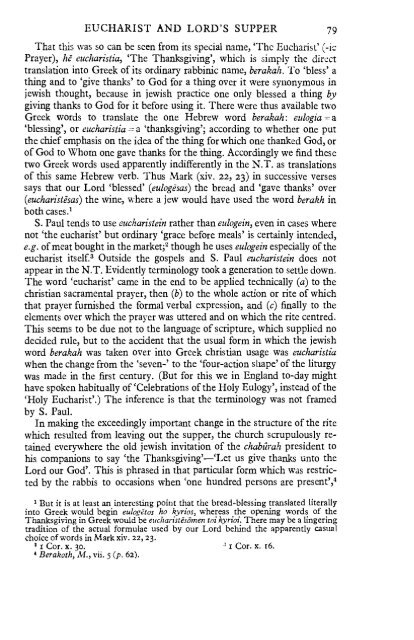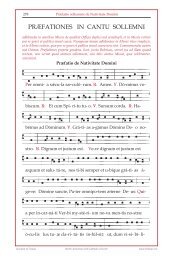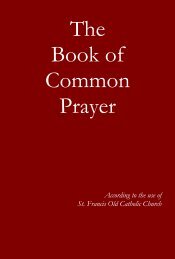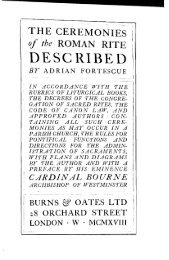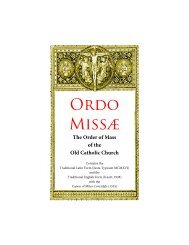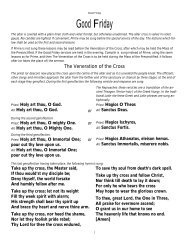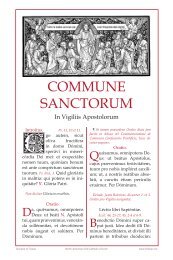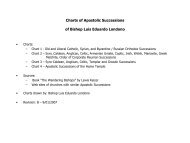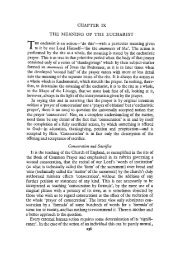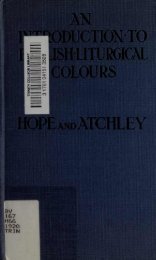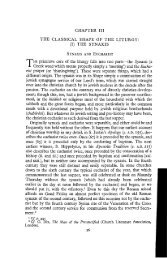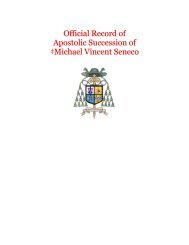Eucharist and Lord's Supper
Eucharist and Lord's Supper
Eucharist and Lord's Supper
You also want an ePaper? Increase the reach of your titles
YUMPU automatically turns print PDFs into web optimized ePapers that Google loves.
EUCHARIST AND LORD'S SUPPER 79<br />
That this was so can be seen from its special name, 'The <strong>Eucharist</strong>' (-ic<br />
Prayer), he eucharistia, 'The Thanksgiving', which is simply the direct<br />
translation into Greek of its ordinary rabbinic name, berakah. To 'bless' a<br />
thing <strong>and</strong> to 'give thanks' to God for a thing over it were synonymous in<br />
jewish thought, because in jewish practice one only blessed a thing by<br />
giving thanks to God for it before using it. There were thus available two<br />
Greek words to translate the one Hebrew word berakah: eulogia = a<br />
'blessing', or eucharistia= a 'thanksgiving'; according to whether one put<br />
the chief emphasis on the idea of the thing for which one thanked God, or<br />
of God to Whom one gave thanks for the thing. Accordingly we find these<br />
two Greek words used apparently indifferently in the N.T. as translations<br />
of this same Hebrew verb. Thus Mark (xiv. 22, 23) in successive verses<br />
says that our Lord 'blessed' (eulogesas) the bread <strong>and</strong> 'gave thanks' over<br />
(eucharistesas) the wine, where a jew would have used the word berakh in<br />
both cases.!<br />
S. Paul tends to use eucharistein rather than eulogein, even in caseswhere<br />
not 'the eucharist' but ordinary 'grace before meals' is certainly intended,<br />
e.g. of meat bought in the market;2 though he uses eulogein especiallyof the<br />
eucharist itself.3 Outside the gospels <strong>and</strong> S. Paul eucharistein does not<br />
appear in the N.T. Evidently terminology took a generation to settle down.<br />
The word 'eucharist' came in the end to be applied technically (a) to the<br />
christian sacramental prayer, then (b) to the whole action or rite of which<br />
that prayer furnished the formal verbal expression, <strong>and</strong> (c) finally to the<br />
elements over which the prayer was uttered <strong>and</strong> on which the rite centred.<br />
This seems to be due not to the language of scripture, which supplied no<br />
decided rule, but to the accident that the usual form in which the jewish<br />
word berakah was taken over into Greek christian usage was eucharistia<br />
when the change from the 'seven-' to the 'four-action shape' of the liturgy<br />
was made in the first century. (But for this we in Engl<strong>and</strong> to-day might<br />
have spoken habitually of 'Celebrations of the Holy Eulogy', instead of the<br />
'Holy <strong>Eucharist</strong>'.) The inference is that the terminology was not framed<br />
by S. Paul.<br />
In making the exceedinglyimportant change in the structure of the rite<br />
which resulted from leaving out the supper, the church scrupulously retained<br />
everywhere the old jewish invitation of the chabfirah president to<br />
his companions to say 'the Thanksgiving'-'Let us give thanks unto the<br />
Lord our God'. This is phrased in that particular form which was restricted<br />
by the rabbis to occasions when 'one hundred persons are present',4<br />
1 But it is at least an interesting point that the bread-blessing translated literally<br />
into Greek would begin eulogetos ho kyrios, whereas the opening words of the<br />
Thanksgiving in Greek would be eucharistesomentoi kyrioi. There may be a lingering<br />
tradition of the actual formulae used by our Lord behind the apparently casual<br />
choice of words in Mark xiv. 22,23.<br />
, I Cor. x. 30. 3 I Cor. x. I6.<br />
• Berakoth, M., vii. 5 (p. 62).


